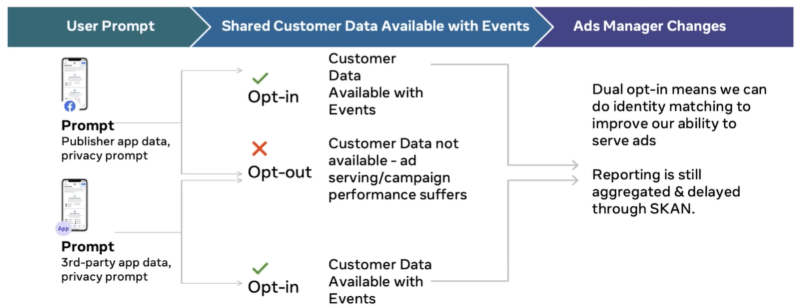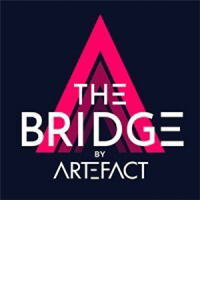¿Cómo afectará a los anunciantes la actualización de iOS 14 de Apple?
En primer lugar, la actualización de iOS 14 es en realidad un paso de iOS 14.3 a iOS 14.4. Así que es posible que ya tenga iOS 14.3 si usted es dueño de un teléfono inteligente de Apple, pero esta versión aún no incluye todas las restricciones que se cubren a continuación. En septiembre de 2020, Apple anunció que su objetivo era proteger mejor a sus clientes data lo que requiere tres reglas:
Comunicación de data recopilado : todas las aplicaciones de la tienda de aplicaciones deben enviar a Apple el data recopilado durante el seguimiento.
Solicitud de consentimiento: todas las aplicaciones de la tienda de aplicaciones tendrán que pedir permiso al usuario para recopilar su data (esto se denomina ATT por App Tracking Transparency de Apple). Esta solicitud se traduce en la aparición de una ventana emergente al abrir la aplicación con una petición de consentimiento (véase más abajo).
Data restricciones para las plataformas publicitarias: Facebook, al igual que todas las plataformas publicitarias, tendrá que utilizar un proceso que restrinja, agregue e imponga un retraso a las acciones realizadas por el usuario dentro de la app móvil o el sitio web. Para ello, la dirección data deberá pasar por un servidor de Apple (SKadNetwork) que servirá de catalizador para restringir, agregar y, a continuación, añadir un periodo de 24 a 48 horas antes de enviar la dirección data a las plataformas publicitarias correspondientes.
¿Cuáles son las consecuencias para la medición del rendimiento en plataformas como Facebook Ad Manager?
Menos volúmenes: estas restricciones conllevan lógicamente una pérdida de señales para los usuarios de smartphones de Apple que hayan decidido no dar su consentimiento. Por lo tanto, las campañas publicitarias no rendirán menos en términos absolutos, pero su rendimiento mostrado en la plataforma Facebook Ad Manager será menor porque algunos compradores no serán contabilizados si no dan su consentimiento. Para estimar una posible pérdida, las primeras cifras indican que, de media, el 70 % de los usuarios de iOS responderán "no" a la solicitud de consentimiento (el aviso).
Disminución de la ventana de atribución: tras la implementación de iOS 14.4, la ventana de atribución será de 24 horas a 7 días post-clic y desaparece la post-impresión. En consecuencia, los trayectos de compra superiores a 7 días dejarán de ser identificables y los análisis de trayectos dejarán de ser fiables más allá de 7 días para los usuarios de iOS.
Empobrecimiento de los algoritmos: como consecuencia de la reducción de las ventanas de atribución, los algoritmos verán limitada su recopilación de data . Del mismo modo, los algoritmos necesitan la mayor cantidad posible de data para tomar mejores decisiones (al menos 50 eventos recopilados durante un periodo de 7 días para un funcionamiento óptimo). Con el agotamiento de los algoritmos, esperamos una posible pérdida de rendimiento en los usuarios de iOS 14.
Restricciones en el número de eventos rastreados: debido a que Apple está restringiendo las plataformas publicitarias, ya no será posible utilizar más de 8 eventos de rastreo diferentes para un dominio / sitio web determinado. A este respecto, pocos anunciantes utilizan más de 8 eventos diferentes, por lo que el impacto sigue siendo limitado. Al mismo tiempo, los eventos deberán priorizarse en el Administrador de anuncios para que Facebook pueda conocer su orden de importancia y optimizar mejor los resultados.
¿Qué medidas deben tomar los anunciantes?
Medidas a tomar a corto plazo:
Verifica tu dominio en tu Business Manager. Facebook tendrá entonces la confirmación de que eres el propietario de este dominio (ej: nike.com) y abrirá el acceso a la configuración de los 8 eventos. Ten en cuenta que nike.fr y nike.es serían dos dominios diferentes para verificar. Nike.com/fr y Nike.com/es o fr.nike.com y es.nike.com pertenecen a un único dominio a verificar(nike.com).
Garantizar el uso de un máximo de 8 eventos y priorizarlos. Esto es posible una vez finalizada la verificación del dominio
Anticiparse a los cambios en la ventana de atribución y actualizar las reglas automatizadas / los parámetros de campaña. Esto es posible después de haber priorizado los eventos.
Configurar la solución Facebook Conversion API para soportar el píxel data: estamos trabajando activamente en este tema, se trata de una conexión de servidor a servidor que permite subir más información / data a Facebook y así limitar la pérdida de data dentro de las campañas. En resumen, el objetivo es depender menos de los píxeles / cookies y por lo tanto de las restricciones de iOS 14.
Configura Facebook Attribution para mantener una vista de + 7 días: Facebook Attribution se está rediseñando y la nueva versión seguirá evaluando el rendimiento de Facebook en ventanas de atribución de 28 a 90 días a pesar del bloqueo de iOS (Facebook aún no ha comunicado su forma de conciliar la data). Por lo tanto, es muy probable que, a largo plazo, Facebook Ad Manager siga siendo la plataforma dedicada a la gestión de campañas, pero que Facebook Attribution se convierta en la plataforma de optimización, análisis y elaboración de informes.
Para concluir, el impacto de iOS 14.4 es significativo y no solo afecta a Facebook. Todos los actores de la publicidad digital se ven igualmente afectados por estas restricciones y lo comunicaremos a medida que dispongamos de más información.



 BLOG
BLOG





